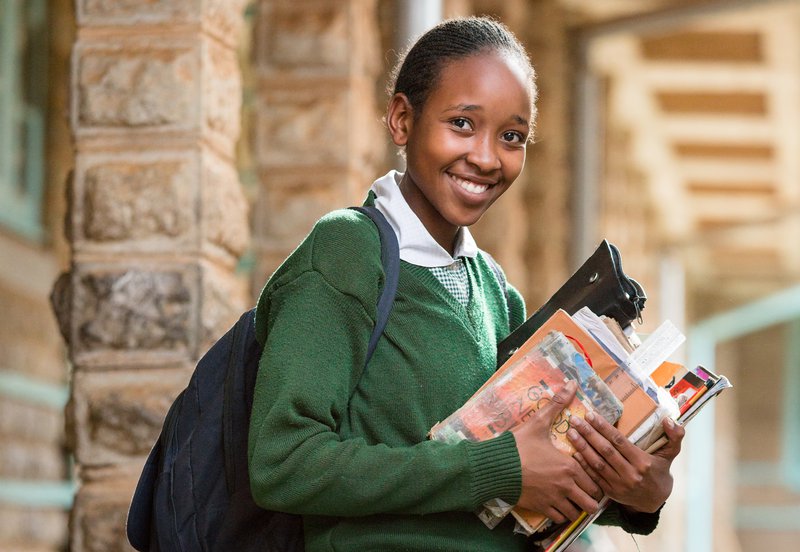RTEI 2019 Advocacy Partners Announced
Jan. 31, 2019RESULTS Educational Fund is pleased to announce its RTEI 2019 Advocacy Partners. Six RTEI 2018 partners will receive support to carry forward in-country advocacy strategies around RTEI 2018 findings.

Student with school materials, Nyeri Primary School, Nyeri County, Kenya. Photo credit: GPE/Kelley Lynch
By Vivian Purcell and Tony Baker
After receiving and evaluating RTEI 2018 data from our 21 country partners, RESULTS Educational Fund invited those partners from the Global South to submit proposals to implement in-country advocacy strategies in 2019 around the RTEI 2018 findings. Thirteen partners submitted proposals for the six openings.
Following careful review by RESULTS and the RTEI Advisory Group, the RTEI team is pleased to announce the RTEI 2019 Advocacy Partners and their strategic areas of advocacy:
Brazil – Campanha Nacional pelo Direito a Educacao (Campanha): Education Financing and Cost of Initial Quality Education per Student (CAQi)
- Through RTEI 2018, it was identified that key issues in Brazil relate to indicators used to calculate the Cost of Initial Quality Education per Student (CAQi) and Cost of Quality Education per Student (CAQ). These were developed to guarantee resources to be invested per student in each stage of public basic education under the National Education Plan approved in 2014. By engaging the national government and members of parliament, Campanha seeks to increase financing to basic education through a model of transparency that places parents and school administrators in greater control of resources by guaranteeing the implementation of the CAQi/CAQ.
Indonesia – Network Education Watch Indonesia (NEW): Protecting Children from Violence and Abuse in School
- The outcome of RTEI 2018 research indicated that the trend of violence in education in Indonesia is still quite high, with data showing that 84 percent of students have experienced violence in school, either by teachers, school officers, or peers. NEW will implement strategies that strengthen and encourage the government and parliament to protect children from violence and abuse in school, as well as improve the ability of school committees to play a role in protecting children from violence and participate in monitoring and reporting cases of violence and abuse in school. NEW will focus on working with school committee members to protect children from violence and abuse in school in order to raise awareness and pursue Sustainable Development Goal (SDG) target 4.A: “Build and upgrade education facilities that are child, disability and gender sensitive and provide safe, non-violent, inclusive and effective learning environments for all.”
Kenya – Hakijamii: Expulsion of Pregnant Girls from School
- Through RTEI 2018, Hakijamii identified that girls of school age who are pregnant or have had a baby are typically expelled from school when teachers and school administrators learn about the pregnancy. Studies identified that approximately 13,000 girls leave school every year due to pregnancy, despite the Kenyan constitution forbidding discrimination on the ground of pregnancy as well as a Return to School Policy and a National School Health Policy. By engaging county MPs and education boards, school committees, and the media, this project aims to stop schools from expelling pregnant girls and young mothers, thus denying them the right to education.
Pakistan – Pakistan Coalition for Education (PCE): Right to Education, SDG4, Girls and Disadvantaged Groups
- The overall goal of PCE’s strategy is to enhance engagement of all stakeholders in education sector processes to ensure inclusive policymaking for the implementation of the right to education, with a special focus on girls’ education and accountability. In its RTEI advocacy strategy, PCE aims to engage and create a dialogue space between civil society, citizens, media, and policymakers in regard to education policies and plans to implement the right to education effectively. PCE hopes to bring the right to education to the forefront of policy dialogue, holding the government accountable to its commitments to ensure access to free and quality public education for all.
Palestine – Teacher Creativity Center (TCC): Taxation and Domestic Resource Mobilization for Education
- After identifying a critical need for increased domestic resources for education and a report produced by Al-Marsad (Arab Human Rights Centre in Golan Heights) in collaboration with TCC that highlighted the payment of local taxes as a means to promote equity and quality in education, TCC will work with the national government to encourage tax collection by local governments in Palestine to support education. Through the development of policy briefs, alliances with local NGOs, community mobilization, and media campaigning, TCC will promote means of establishing effective and accountable taxation mechanisms and seek to increase budget transparency.
Uganda – Initiative for Social and Economic Rights (ISER): Right to Education, Free Education, Learning Environment, and Discrimination of Children with Disabilities
- In Uganda, RTEI findings revealed that both tuition and non-tuition fees continue to be a significant barrier to access education, despite Universal Primary and Secondary Education programs. High levels of discrimination of children with disabilities were also found, and learning environments are precarious with some learners studying under trees or in dilapidated classrooms with no desk or chairs. ISER will use RTEI results and findings to inform ministry officials, members of parliament, regional and international human rights mechanisms, and SDG monitoring platforms of Uganda’s educational needs.
Each partner will receive a US$20,000 grant to implement these advocacy strategies in 2019. They will be additionally supported by RTEI Global Partners to facilitate knowledge sharing, joint advocacy initiatives, and global network building around the right to education.
We thank all RTEI partners for their submissions of smart, powerful in-country advocacy strategies and regret not being able to support all of them. We will continue to pursue resources to support more partners and strategies in future years of RTEI and look forward to working with these RTEI Advocacy Partners in 2019!
